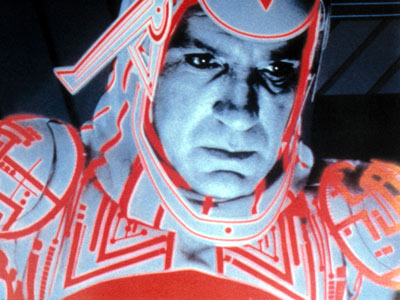
So I was watching South Park's Facebook episode, "You Have 0 Friends," when a masterstroke of a Tron reference tore away at the little part inside that wants me spending all my time in the basement watching '80s sci-fi movies on repeat. That little part and I reached a compromise in re-visiting Tron tonight, and I've got to say: as much as I loved this film as a kid, I can't help loving it all the more fiercely upon repeat viewings.
The crush begins almost the moment the Walt Disney Productions caption passes away, plunking the viewer almost immediately into the film's dominant action space -- the fantastic, pioneering computer animation of dear sweet 1982. When WALL-E was set for release this past summer, some Negative Nancys and Donnie Downers protested that children wouldn't be able to handle thirty minutes without dialogue, but almost thirty years earlier films like Tron were confidently allowing the viewer to learn all the ins and outs of plot and theme experientially. No spoon-fed PC pap here, no sir! In fact, in viewing Tron you'll even see some "questionable ladies" at one point (soon after an adorable navigation sequence with a clunker of an escape vehicle), and early on hear cutting retorts like "Flynn had 'access' to you, too!" Nonetheless, trust me: kids (old and young alike!) will be too busy savouring the film's fantastic light-show to pay heed to scuttlebutt like that.
Tron follows savvy programmer Kevin Flynn (Jeff Bridges) as he seeks information in his old workplace's computer mainframe that will prove his ex-boss, Dillinger (David Warner), stole his arcade game designs. In this quest, Flynn is helped by "user" Dr. Lora Baines and "program" Yori (Cindy Morgan), as well as "user" Alan Bradley and "program" Tron (Bruce Boxleitner). Tron is a security program designed to combat Master Control Program (MCP), who is seeking world domination by assimilating useful external programs into his ever-expanding matrix. This unpleasant fellow, once but a wee chess program, now oppresses the cyber-realm and all its poor inhabitants. Poorest of these are the programs the MCP doesn't consider useful: after mediocre training they're pitted against one another in arcade game combat until inevitable de-resolution. Kind of a twisted guy, for a computer program! Oh, and did I say Baines helps Flynn in this film? That's debatable! After all, her super-awesome digitalizing laser is -- gasp! -- used for evil by the MCP, who digitizes Flynn and forces him to compete in his dastardly arena to the death. Nice work, Baines!
The conceits of this film are not only easier to stomach than our contemporary technological Tron, Avatar: they're also more relevant. Viewing Tron today, anyone who's ever written so much as a blog post, ever, will recognize the impossible depth of interaction between content and code in the MCP's matrix. You'll chuckle heartily at what passes for code, PERIOD, in this pointedly '80s piece. But while we're all rightly justified in listing the million and one ways in which Skynet screws up, big-time, with both its defensive and offensive strategy in last year's Terminator Salvation, with Tron the journey through this bad-ass mainframe -- the nostalgic back-lit animation, the wondrous colour-blocking that makes up for under-developed emotional crises -- is everything. It speaks profoundly to the age of possibility that marked our society's shift into the information age; the wide-eyed speculation surrounding Penrose and the mere, fanciful notion of all-powerful functional AIs. All that whimsy, all that wonder, all those dominant, hopeful, overly simplistic questions in the midst of the Cold War, are packaged beautifully in Tron.
So no, when you get right down to it, those of us who grew up loving Tron just don't care that the MCP's a pretty shitty program when it comes to search-and-destroy algorithms. And we just don't care that Flynn's target file could and should have been deleted without possibility of recovery by any self-respecting cyber-thief -- thus effectively killing the entire premise of the film.
What we care about? What we really care about? Light Cycles. Aw yeah.
No comments:
Post a Comment